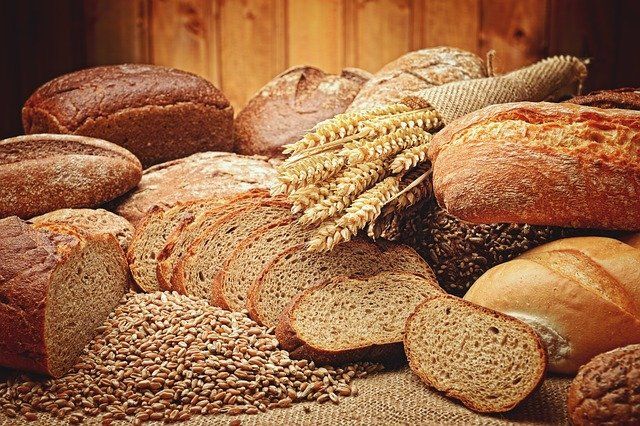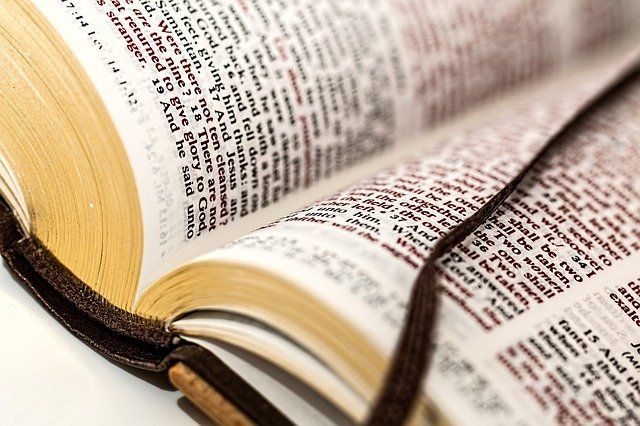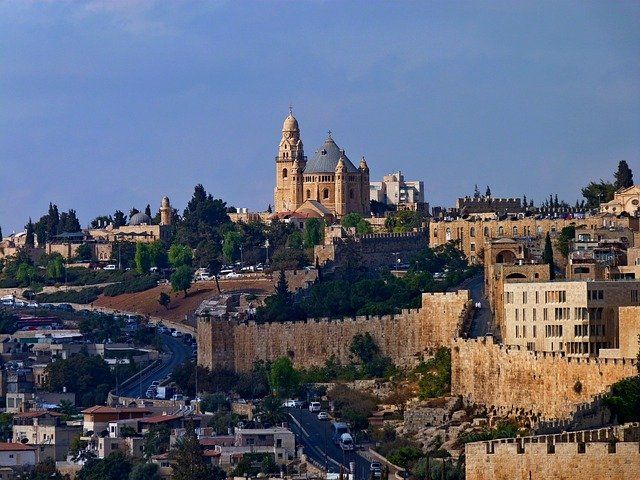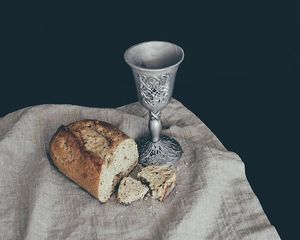For as often as you eat this bread and drink this cup, you proclaim the Lord’s death till he comes’ (1 Corinthians 11:26)
If Paul had written his first Corinthian letter specifically to your church, you would by now be smarting under his rebukes. Problem after problem surfaces in this letter. In chapters 11-14, he discusses the order of the church – not in the manner of an academic discourse, but to correct abuses in the church, addressing the consciences of the members in the most pointed terms. In 11:17-22, he revisits the subject of disunity, which he began to address in the first chapter. Evidently, they had meals together as a church. This was the agape, or ‘love feast’. These were supposed to unite people, but they ended up proving their disunity and selfishness. Then, in full flight of dissension or even dissipation (11:21), they sat down at the Lord’s Table! How they imagined that this travesty of sacramental observance could be pleasing to God, and a blessing to themselves, is beyond comprehension. Since their actual behaviour flew in the face of the meaning of Christ’s death, such ‘communion’ was a virtual trampling on the Saviour. They were already suffering the judgements of God (11:30), but were the last to discern their own desperate spiritual condition.
Now, what is the Lord’s Supper supposed to do for the church? It is certainly not to be an empty ritual where people pretend to be one in Christ, while their hearts are far from him and from one another. The Supper, as we have already seen, is supposed to be a means of grace, not an occasion of self-centredness and drunkenness! (See Shorter Catechism 88.) So let us notice, firstly, what the Lord’s Supper is to be to us, namely a means of grace, and secondly, how the Lord’s Supper fulfils its intended purpose in us, namely through visible signs.

A means of grace
The essential idea of the Lord’s Supper is summed up in Paul’s commentary on the institution: ‘For as often as you eat this bread and drink this cup, you proclaim the Lord’s death till He comes’ (1 Corinthians 11:26). On the face of it, the focus here is upon what the communicants are doing, namely, eating and drinking and proclaiming, with respect to Christ’s death. It would be a mistake, however, to think of this exclusively in terms of human activities. Their actions, in fact, flow from the sovereign initiative of God. They stem from the free grace by which men and women come to believe in Christ in the first place, and then grow spiritually as he feeds them with the bread of life. God acts in the Supper. God acts in our actions. God enacts our blessing. His grace is conveyed to the souls of believers through faith, as they come, willingly and believingly, to the Table of the Lord.
What is this grace?
What is this grace, of which the Supper is a ‘means’?When we say that grace is conveyed in the Lord’s Supper, we must be clear as to what we mean by grace. When the Bible speaks about grace, it does so in a number of different ways.
Objectively, grace is variously described as: (1) an attribute of God’s character (as in ‘the God of all grace’, 1 Peter 5:10); (2) an attitude of God toward particular people (‘Do not be afraid, Mary, for you have found favour [grace] with God’, Luke 1:30); and (3) the unmerited favour of God in justifying sinners (‘by grace you have been saved through faith, and that not of yourselves’, Ephesians 2:8).

Subjectively, grace is that power of God that we experience acting upon our hearts. This experience comes when God, by his Holy Spirit, convicts us, converts us, changes us and confirms us through the gospel of Christ. It happens under the preaching of the Word: ‘So then faith comes by hearing, and hearing by the Word of God’ (Romans 10:17). ‘Sanctify them by your truth. Your word is truth’ (John 17:17). It also takes place in connection with the sacraments, baptism and the Lord’s Supper. These supplement the Word by using signs to seal God’s promises to his people. He conveys his grace to his people as they participate in a believing manner.
What happens in the Lord’s Supper?
Several things happen, between the Lord and his people, as they faithfully partake of the Supper.
1. Believers confess their faith in Jesus Christ. They ‘proclaim’ the Lord’s death (11:26).
From the perspective of the individual communicant, this is nothing less than a personal confession, before God, the church and the world, that Christ is their Saviour and Lord. To take the bread and the cup is to give public testimony to personal faith in, and commitment to, the crucified and risen Jesus. A cold, ritual participation is a travesty. Without heartfelt devotion to Christ, and an enthusiastic resolve to be his disciple, there is no reason to expect any blessing from God. Without faith, it is impossible to please God (Hebrews 11:6).
As a symbolic feast, the Supper also has a profound corporate dimension. It draws believers together in the fellowship of Christ’s saving work, as they confess the same Lord and the same faith. This fellowship was routinely flouted by the Corinthians, by their divisions (11:18), factions (11:19), and shaming of those who had nothing (11:22). Their denial of fellowship was what triggered the judgements, which God brought upon them (11:30). They should, therefore, ‘wait for one another’ (11:33). They should come together in such a unity of heart and practice as would demonstrate that they were properly ‘discerning the Lord’s body’ (11:29).

2. Believers commune with Jesus Christ.
Jesus is ‘the bread of God … who comes down from heaven and gives life to the world.’ He tells us, ‘I am the bread of life. He who comes to me shall never hunger and he who believes in me shall never thirst’ (John 6:33-35). In the Supper, Christ feeds believers under the symbols, the elements of bread and wine. There is a spiritual communion, a feeding on Christ by the Holy Spirit and through faith in him. When Jesus instituted the Lord’s Supper he said, ‘I will not drink of this fruit of the vine from now on until that day when I drink it anew with you in my Father’s kingdom’ (Matthew 26:29). That kingdom is already established, even though it awaits its consummation and completion when Jesus returns. Surely our fellowship at the Lord’s Table is a foretaste and anticipation, in sign and symbol, of the substance of the ‘marriage supper of the Lamb’ that will take place in heaven (Revelation 19:7-9). Jesus already communes with believers and will continue to do so while the world lasts.
3. Believers receive grace from Jesus Christ.
Why did Jesus institute the Supper? Answer: so that it would be to us a ‘cup of blessing’. The cup is blessed in itself for what it represents, and therefore is designed to be a blessing to those who partake of it. ‘The cup of blessing which we bless, is it not the communion of the blood of Christ? The bread which we break, is it not the communion of the body of Christ?’ (1 Corinthians 10:16). Clearly, the blessing flows from the Lord, in virtue of his atoning death for sinners. He imparts himself, his comfort, his assurance, his love – the very love that brought him from eternity to Calvary in the first place.
Here, then, is what the Lord’s Supper is to be to us – a means of grace; a conveyance of divine love to the soul; an imparting of Christ to the renewed heart; a communion of saints with their Saviour.

The visible signs; no power in themselves
How is the Lord’s Supper a means of grace to believers? In what way or ways does the Lord make the connection with us and impart his grace to us? The general answer is that he accomplishes this through visible signs, which represent the realities of invisible grace.
Human nature is addicted to venerating its traditions, myths, relics and symbols. From science fiction to religion, the attraction of things magical appears irresistible. The ‘Holy Land’ (Israel), the ‘Holy Places’ (Jerusalem, etc.) and the ‘Holy Father’ (the pope), for example, all conjure up an aura of the immediate and miraculous presence of the divine. They excite millions, shape international politics, and have even caused wars. Yet, from a biblical perspective, such ‘holiness’ is entirely bogus.
In the case of the Holy Supper (as the Lord’s Supper is often quite properly called), the holiness does not reside in some grace operating in the substance of the bread and wine, and automatically conveyed to any who partake of it. Nor is it found in the correct administration of the sacrament. There is no ‘miracle of the mass’, in which bread becomes flesh at the tinkling of the bell and the priestly utterance, ‘Hoc est corpus meum‘ (This is my body). That is magic, not miracle. And it was not what Jesus did when first he spoke these wonderful words. Jesus was still the whole Jesus and the bread he gave to the disciples was still bread. The power of the Lord’s Supper is in the presence of Christ working by the Holy Spirit in the hearts of believing participants, who receive the Supper in faith. The transaction is no less wonderful, or supernatural, for being spiritual rather than physically magical.

















